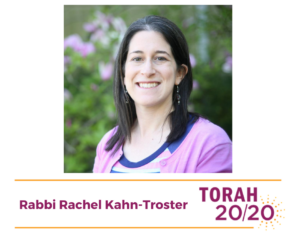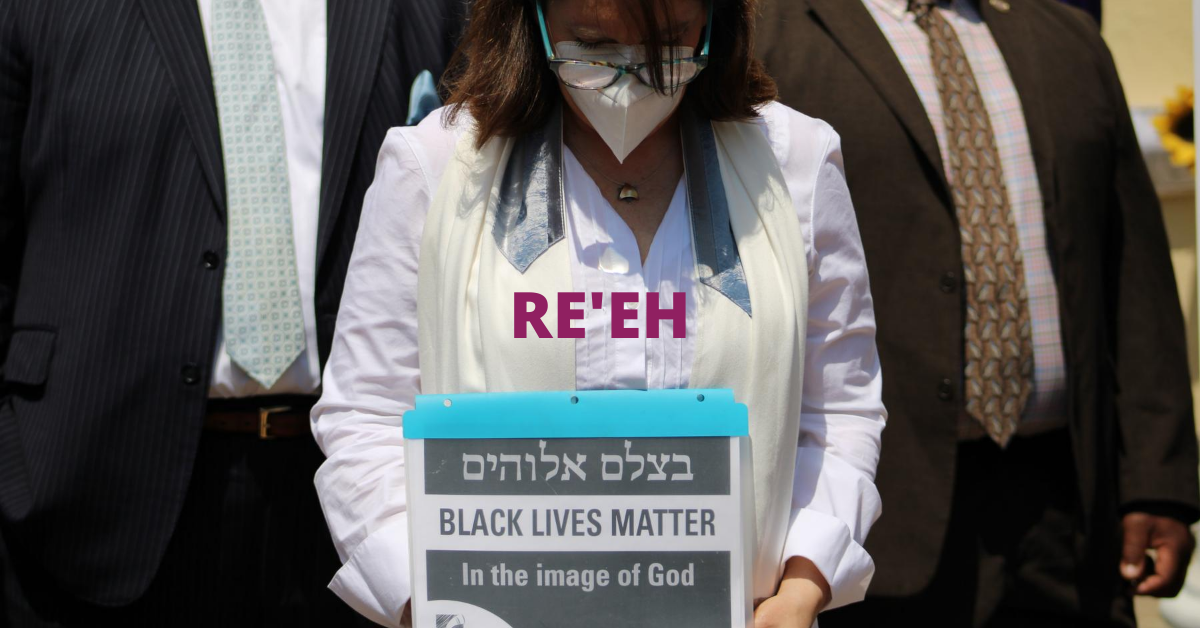A d’var Torah for Parshat Re’eh by Rabbi Rachel Kahn-Troster.
Reprinted with permission from the Jewish Standard.
One of my favorite parts of any protest is the artwork, taking in all the different signs. Festooned with bright and powerful messages, these signs and banners signal to passersby the change that needs to happen in the world. The slogans offer big promises, a taste of the world that the activists would like to see or the basic values that they would like to see upheld: “Black lives matter.” “Families belong together.” “Healthcare is a human right.” “Justice for farmworkers.”
As an organizer who encourages people to march for justice and bring their activism to the streets, I often get asked if the signs and slogans of protests are unrealistic, or would turn people away with their seemingly out of reach demands and strong language.
For example, “Why say, ‘defund the police’ if you are asking for budget cuts?” was something I heard a lot during this summer’s Black Lives Matter protests against police violence. I would answer that if you can’t start with what is most important — if you can’t begin with your vision of the world as it should be, the world that you will fight to make possible — then you are losing your chance at defining the parameters of that world.
Instead, you are left to make the world as it is incrementally better but not radically so. Even worse, settling for small changes might mean ignoring the direct asks of those most affected by issues of injustice. We take our lead from these communities, and they are asking us to both envision and demand how investing in communities or centering human rights — truly treating every person as created in the image of God — would reshape our world.
Sign up to receive Torah 20/20 in your inbox each week.
Parshat Re’eh is in tension between the world as it is and the world as it should be. It includes an idyllic vision of what an Israelite settlement would look like if people were in harmony with God and with each other, not just surviving but thriving:
There will be no needy among you — since Adonai your God will bless you in the land that Adonai your God is giving you as a hereditary portion — if only you heed Adonai your God and take care to keep all this instruction that I enjoin on you this day. (Deuteronomy 15:4-5)
Immediately, the surface of this vision shatters. “If,” says Moses, if despite all this blessing, there is a needy person among you, then you need to respond with compassion and not with miserliness or suspicion.
Do not harden your heart and shut your hand against your needy kinsman. Rather, you must open your hand and lend him sufficient for whatever he needs. (15:7-8)
If everything were in alignment with God, expressed through blessing and success, one might be tempted to blame the poor person for their situation and turn them away. Parshat Re’eh reminds us that this is unreasonable and unjust. The Torah has set forth a vision of the world that could be. To get there requires a commitment to justice in the world that is.
Find more commentaries on Parshat Re’eh.
The thread between those two poles is found in hearing the voices of the poor in the land, voices that break through even when you think you might be living in the world as it should be. “They [the poor kinsman] will cry out to God and you will incur guilt.” (15:9) They cry out to God because they have been ignored. They escalate to the divine because they understand that we live in the world as it is, but we do not have to accept that reality as fixed — and yet they live among people who would prefer to accept that reality. It is the moral obligation of those with means — the ones who can loan to the poor, who can understand generosity as an obligation and not a choice — to move towards the world as it should be.
Indeed, the Torah ends this section by returning to the world as it is, that the needy will always be there, no matter what actions people take (15:11). One might ask, why bother at all with starting with the idea that there will be no needy, only to backtrack? The protest signs and slogans also envision audacious change, and that audacious vision becomes the basis for conversations, policies, and changes to the structures of the world as it is. Re’eh urges not to begin with compromise but to envision the world where God’s blessings are enjoyed by all.
“There Will be No Needy Among You” is our protest sign — this is our starting place. The rest is for the negotiating table.
Rabbi Rachel Kahn-Troster is the Deputy Director and lead strategist on T’ruah’s human rights campaigns and heads the organizing and training of more than 2,000 rabbis and cantors. Ordained in 2008 from the Jewish Theological Seminary, where she was a student activist and leader, she is a noted speaker and writer on Judaism and human rights. Rabbi Kahn-Troster serves on the board of the Alliance for Fair Food and is the Vice Chair of the board of the Interfaith Center on Corporate Responsibility. She lives in Teaneck, New Jersey, with her husband, Dr. Paul Pelavin, and their daughters Liora and Aliza.
campaigns and heads the organizing and training of more than 2,000 rabbis and cantors. Ordained in 2008 from the Jewish Theological Seminary, where she was a student activist and leader, she is a noted speaker and writer on Judaism and human rights. Rabbi Kahn-Troster serves on the board of the Alliance for Fair Food and is the Vice Chair of the board of the Interfaith Center on Corporate Responsibility. She lives in Teaneck, New Jersey, with her husband, Dr. Paul Pelavin, and their daughters Liora and Aliza.

